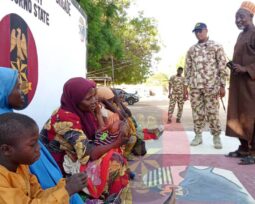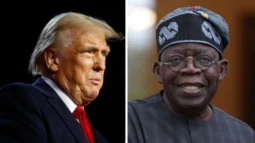By Umar Sani
Senator George Akume’s recent claim that the North should forget the 2027 presidency and wait until 2031 is not just misleading it’s self-serving and fundamentally anti-democratic. His argument, based on an “unwritten” power rotation principle since 1999, falls apart when tested against both history and logic. In a multi-party democracy like Nigeria’s, what matters is the will of the people, not recycled elite agreements.
Let’s start with the basics. In 2015, Goodluck Jonathan was denied a second full term despite being a Southerner and having only served one term after completing Yar’Adua’s tenure. The APC Akume’s party didn’t respect any zoning agreement then. Instead, it mobilized electoral power and defeated him at the ballot. Suddenly, now that it suits the South to retain power, rotation has become a sacred cow?
If Akume truly believes in fairness, let him first explain why in his home state of Benue, the Idoma and other minority groups have never produced a governor. The Tiv ethnic group, to which he belongs, has monopolized that office since 1999. Why didn’t he campaign for rotation there? Why didn’t he tell his people to wait their turn?
He goes further to invoke religion, suggesting that if God wills, Atiku can be president at 90. That’s not just condescending it’s deeply unserious. Nigerian democracy should not be reduced to spiritual guesswork. No Nigerian needs permission to run for president based on where they come from or how old they are. If a candidate can win support across regions, they deserve to be on the ballot. That’s the only rotation that matters rotation of ideas, performance, and popular support.
The recent article in Sunday Vanguard, titled “Peter Obi, Atiku and the Numbers That Cannot Be Ignored”, offers a more grounded perspective. The piece shows clearly that both Obi and Atiku remain formidable forces. In the 2023 election, Tinubu got 8.7 million votes, Atiku 6.9 million, and Obi 6.1 million. That’s a deeply competitive race one that proves democracy is about numbers, not regional entitlement.
The breakdown is even more telling:
• Atiku dominated in the North-East and parts of the North-West.
• Obi swept the South-East and did well in South-South and parts of North-Central.
• Tinubu won the South-West and narrowly took the North-West.
No single region controls enough votes to dictate who becomes president. Success lies in building coalitions, not enforcing silence.
The Vanguard article rightly observes that any party ignoring these electoral numbers does so at its own risk. The idea of a forced wait until 2031 is not only unjust it’s out of touch. A merger between Obi’s political momentum and Atiku’s northern base could reshape 2027 entirely, especially if they unite under a common platform.
Akume’s appeal to old agreements and gentleman politics may sound noble on the surface, but in reality, it is designed to protect the status quo, not serve the people. His voice was silent when zoning worked in his favour. He never challenged injustice in his backyard. Why now?
Democracy is not about waiting for turns. It’s about earning trust, securing votes, and delivering results. If President Tinubu wants a second term, let him seek it like everyone else through elections, not endorsements.
Akume’s logic belongs in 1999. This is 2025. The numbers don’t lie, and the people are watching. Let every Nigerian, regardless of region or religion, bring their ambition to the table. And let the ballot decide.
Rotation is not an election. Nigeria deserves better.







